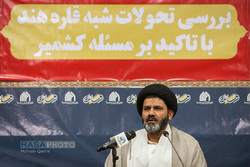 An academic meeting, entitled “Developments in the Indian Subcontinent with an Emphasis on the Kashmir Issue,” was held at the headquarters of Rasa News Agency with guest speaker, Hujjat al-Islam Sayyed Shafaqat Hussain Shirazi.
An academic meeting, entitled “Developments in the Indian Subcontinent with an Emphasis on the Kashmir Issue,” was held at the headquarters of Rasa News Agency with guest speaker, Hujjat al-Islam Sayyed Shafaqat Hussain Shirazi. RNA – An academic conference entitled “Developments in the Indian Subcontinent with an Emphasis on the Kashmir Issue” has been hosted by Rasa News Agency at the headquarters of the news agency in Qom. A number of experts from India and Pakistan were present.
Hujjat al-Islam Sayyed Shafaqat Hussain Shirazi, the international leader of the Majlis Wahdat-e-Muslimeen, one of the largest Shi’ah institutions in Pakistan, and several speakers and cultural and political activists from Indian-occupied Kashmir discussed the history of the subcontinent, the current domestic situation and the international implications of the revocation of the special status of the state of Jammu and Kashmir by the Government of India.
At the beginning of the conference, Hujjat al-Islam Shirazi noted the history of conflict and dissension between Muslims and the colonizers in India and Kashmir, saying, “The United Kingdom, France and Portugal are among the oldest colonial powers in India and such, they divided the country between themselves. They plundered India’s wealth and natural resources.”
The Pakistani scholar added that the arrogant powers turned to the old policy, namely, the creation of sedition, in order to better control the country’s resources. In the first step of this plot, they divided the similar Urdu and Hindi languages in 1867 by making the Devanagari alphabet the official script of Hindi and the Perso-Arabic alphabet the official script of Urdu.
He said that the next step was to strengthen the Deobandi movement and Hindu nationalist movements and to highlight the differences between Muslims and Hindus and added, “Despite these attempts, the Kashmiri people, both Sunni and Shi’ah Muslims, withstood the colonists.”
Hujjat al-Islam Shirazi stated, “Before the beginning of this sedition, a man named Sayyed Ahmad Khan [1817- 1898] was trying to create unity among the people of India but after this sedition began, he withdrew from his principles and advocated the two-nation theory.”
His Eminence continued, “In December 1906, the All-India Muslim League was founded in Dhaka. Muhammad Ali Jinnah entered the Muslim League in 1913. In December 1916, The Lucknow Pact was signed between the National Congress and the Muslim League aimed at protecting the rights of minorities, but this treaty was only on paper and never implemented.”
He noted that during this time, there was a sectarian strife between Muslims and Hindus, with Hindus claiming that they are the indigenous citizens of India and that Muslims are immigrants who must either leave the country or surrender to the Hindus and follow their religion.
Hujjat al-Islam Shirazi said that the issue of Kashmir is an uncompleted agenda by India and added, “The enemies of Islam are trying to harm Islam in every way and are endangering the rights of Muslims under different plots, including the abolishment of their rights.”
He added that Saudi Arabia has supported the actions taken by some Indian Muslim personalities and that there are policies that have been taken in response to demands by the Zionists which are similar to those policies being taken by Israel in the occupied Palestinian territories. The Zionist regime has established a relationship with the Rashtriya Swayamsevak Sangh (RSS), a right-wing Hindu nationalist paramilitary organization, which has stirred up conflict between the Hindu majority and the Muslim minority in the country.
Hujjat al-Islam Shirazi also discussed the fact that Kashmir is split between three countries – Pakistan, India and China but the issue of Kashmir is the concern of the majority Kashmiri Muslim people who desire autonomy and added, “The people of Kashmir are suffering great persecution due to the actions by the Indian government. Muslims must take measures to support the Kashmiri Muslim people it’s too late, just like the situation in Palestine.”
Rasa News Agency
112/971